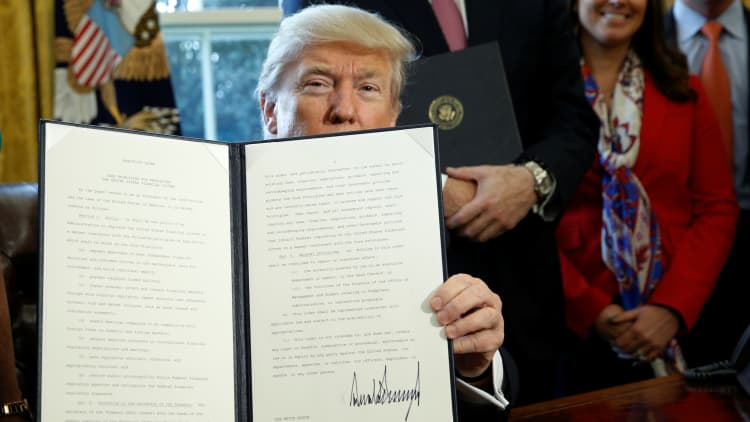
The White House dropped a provision from a presidential memo issued last week that would have delayed a rule requiring your financial advisor to provide you with advice that's in your best interest.
The absence of the delay of the so-called fiduciary rule is sowing confusion over the fate of a regulation estimated to cost the financial services industry as much as $20 billion.
A draft of the memo, which was obtained by CNBC, had instructed the Labor Department to push back the effective date by 180 days and conduct a review of the rule's costs and benefits. A senior White House official briefing reporters less than 24 hours before the memo was finalized Friday said the administration intended to "defer the implementation." As late as Friday morning, opponents of the rule were cheering the expected delay.
"This delay will allow the administration to potentially repeal the rule entirely," Rep. Ann Wagner, R-Mo., said in a statement, later standing next to President Donald Trump in the Oval Office as he signed the memo.
However, final text of the memo released hours after the ceremonial signing on Friday afternoon included no such directive — a substantial change that caught both industry and advocacy groups alike off guard. The delay had been considered a major victory for financial advisers who have argued that the rule unfairly exposes them to litigation and limits investors' choices in saving for retirement. Pushing back the start date also would have given the Labor Department time to determine how the regulation should be changed.
The White House did not respond to a request for comment.
Now, the rule will still go into effect April 10 even as its ultimate fate remains in limbo. The White House did not respond to requests for comment.
"It's fairly uncharted territory. It's very unclear," said attorney Marcia Wagner, who specializes in retirement and employment law. "There is real confusion right now as to whether there will be a delay, and if so, how long it would be. But right now, there is no delay." "
The memo underscores the logistical challenges facing the White House as it attempts to unwind the previous administration's sweeping regulations on everything from health care to the environment to the financial industry. The final text of the memo on the fiduciary rule is more symbolic than substantive, asking the Labor Department to examine whether the regulation reduces investor choice in retirement savings, disrupts the market and increases litigation.
If any of those conditions are met, the agency must rewrite or rescind the rule. Experts said that process could take several months or longer. The current regulation was proposed in 2010 and finalized six years later.
"You're always supposed to enter rule-making with an open mind," former Labor Secretary Tom Perez said in an interview. "It's clear that the administration has already pre-judged this issue."
The fiduciary rule requires investment advisers to put their clients' best interests first and forces them to disclose certain fees received for services. The Obama administration had argued that the rule would save retirement investors about $17 billion a year in fees and lost earning potential. However, industry groups such as the Financial Services Roundtable and the Securities Industry and Financial Markets Association say the regulation effectively forces brokers to put clients in the lowest-fee products, even if a higher-cost product might be more beneficial in the long run.
A senior administration official also argued last week that investors are already protected under the Securities and Exchange Commission so the rule creates unnecessary and burdensome paperwork for financial advisers. A report by consulting firm A.T. Kearney estimated the rule would reduce industry revenue by as much as $20 billion and shift up to $2 trillion in assets.
"SIFMA's members have long supported a best interest standard for brokers who provide personalized investment advice, but the DOL is not the right agency nor is the DOL rule the right approach," the group said in a statement Friday.
During the presidential campaign, Trump strongly supported striking or revising the rule. One of his key advisers, hedge fund manager Anthony Scaramucci, once likened the regulation to the Supreme Court's infamous 1857 Dred Scott decision that declared that African-Americans could not become U.S. citizens. The U.S. Chamber of Commerce and the SIMFA have sued the Labor Department in hopes of blocking the fiduciary rule.
The president's draft memo referenced "pending litigation" as justification for postponing the rule's effective date. It also directed the Justice Department to consult with the Labor Department on whether to seek a stay of litigation after the agency's cost-benefit analysis is complete. Both measures were struck from the final text.
Consumer advocates had questioned whether a delay would violate the Administrative Procedures Act, which requires agencies to provide notice and opportunity for public comment before making changes to regulations that are already on the books. Micah Hauptman, an attorney at the Consumer Federation of America, said the intent of the administration is clear, even if the memo issued Friday lacked teeth.
"Just because the order itself does not, by its terms, delay the rule, does not mean the administration wont' take concrete action to delay and ultimately kill the rule in the near future," he said.

